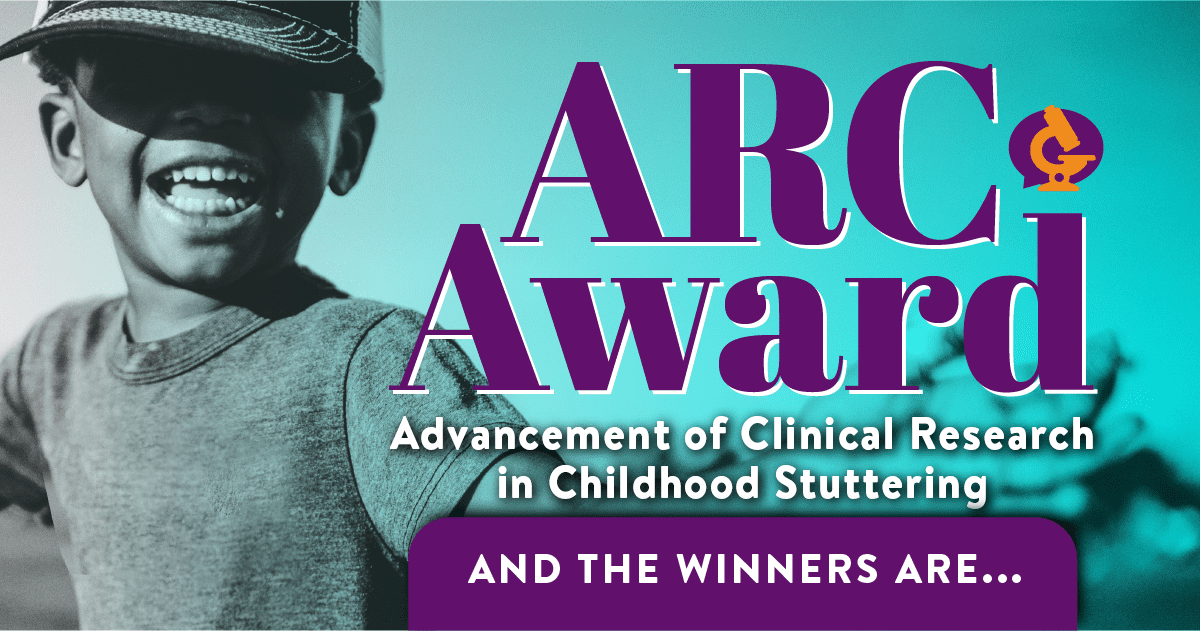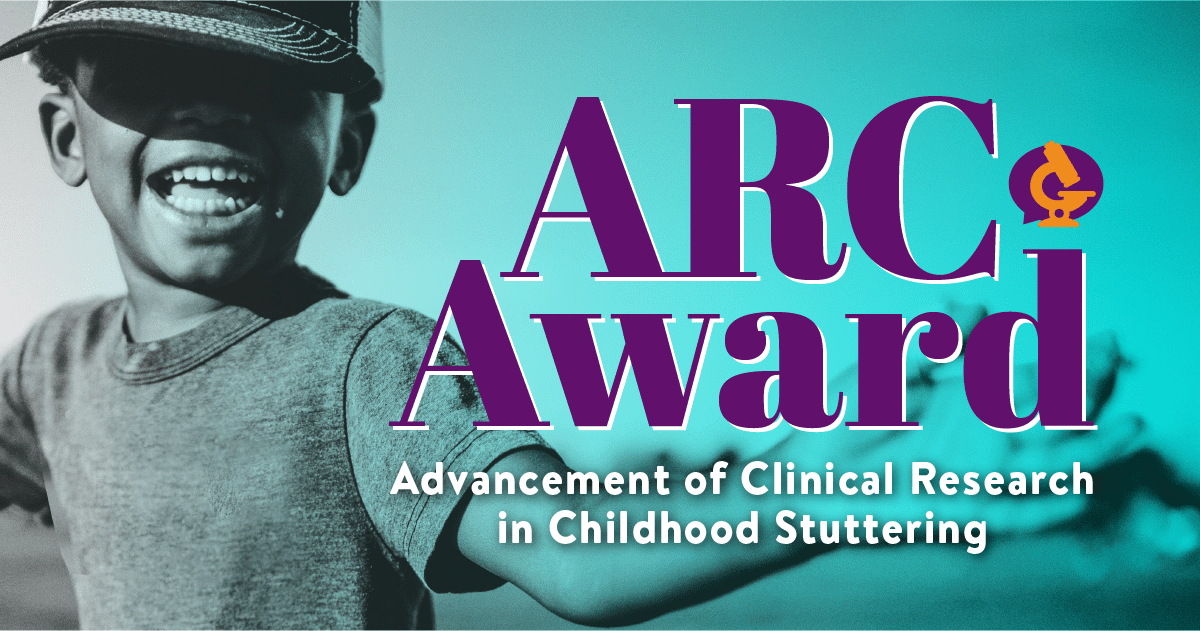

General Information
The Advancement of Clinical Research in Childhood Stuttering (ARC) Award is a $25,000 funding opportunity is designed to support research that will impact service provision for children who stutter in the domains of therapy, assessment, and/or clinical training. Research proposals should advance at least one of the following:
- The knowledge of treatment efficacy in pediatric stuttering or the implementation of clinical evidence into practice.
- Clinical assessment practices through the development of innovative, inclusive tools or procedures to assess children who stutter.
- Training practices in pediatric stuttering through the development of innovative, university-based clinical training and/or education programs for pre-service SLPs.
This award was discontinued after the 2023 award cycle.
General Information
The Advancement of Clinical Research in Childhood Stuttering (ARC) Award is a $25,000 funding opportunity is designed to support research that will impact service provision for children who stutter in the domains of therapy, assessment, and/or clinical training. Research proposals should advance at least one of the following:
- The knowledge of treatment efficacy in pediatric stuttering or the implementation of clinical evidence into practice.
- Clinical assessment practices through the development of innovative, inclusive tools or procedures to assess children who stutter.
- Training practices in pediatric stuttering through the development of innovative, university-based clinical training and/or education programs for pre-service SLPs.
Eligibility
- Proposals to the ARC Award must be for academic research projects focusing on service provision for children who stutter. Proposals for activities other than research are not eligible. Additionally, proposals for research studies focused on areas other than stuttering, are not eligible.
- Principal Investigators (PIs) and Co-PIs applying for the ARC Award must hold a doctorate in an academic discipline or professional field, or appropriate experience in a research-related profession. While graduate students may be part of the research team, they may not be named the PI or Co-PI on the proposal.
- The PI must be affiliated with a non-profit organization or public/governmental institution that is willing to serve as the administering organization if the grant is awarded. The NSA does not award grants directly to individuals. Examples include non-profit or public colleges, universities, school districts, and research facilities, as well as other non-profit organizations with a 501(c)(3) determination from the IRS.
- The PI’s institution/organization where the proposed research will take place must be in the United States.
- Applicants must be able to provide proof of IRB approval to the NSA Research Committee within 45 days of the award notification.
Restrictions
- Proposed budgets for this program are limited to $25,000 total and may not include indirect cost charges, institutional overhead, or travel to conventions.
- Projects proposed may not be longer than 2 years in duration.
- PIs and Co-PIs may only hold one active research grant from the NSA at a time. (This restriction does not apply to the administering organization; organizations may submit as many proposals as they like as long as they are for different projects and have different research teams.)
- This award is not intended to provide the investigator with additional or extended support for an existing study already supported through extramural funds.
Evaluation Criteria
- Significance to the discipline
- Innovation
- Relevance to the NSA Mission
- Approach
- Merit of investigator (Note: Priority will be given to new investigators)
- Environment/Feasibility
- Quality of proposal
- Budget justification
Dates
Opportunity Posting: January 25, 2023
Submission Deadline: March 17, 2023 (5PM et)
Award Notice: May 2023
Application Guidelines
Applications should consist of ONE single-spaced PDF document containing all the required sections in the order they are outlined below. No additional attachments will be accepted. Please label application sections according to the section headers included in these guidelines. Font should be 12 point and noncondensed, and margins should be at least 1 inch. Applications that do not meet the formatting guidelines, including stated page limits, will not be reviewed.
Optional Cover Letter (limit 1 page)
As an option, applicants are invited to include a cover letter requesting the inclusion and/or exclusion of reviewers who could potentially review their application. Justification for the request must be provided. Inclusion of specific reviewers is not guaranteed.
Abstract (limit 1 page)
Concisely describe the study’s focus, specific aims, methodology, and long-term objectives. Describe how the aims of the study align with the NSA’s mission.
Research Plan (limit 8 pages)
- Specific Aims and Significance: Provide an overview of the literature and describe the specific aims of the proposed research. Discuss the significance and need for this study. Emphasis should be placed on the potential impact the study’s activities will have on the delivery of clinical services for children who stutter in the domains of therapy, assessment, and/or clinical training. Clearly describe how the study objectives relate to the NSA’s mission.
- Design and Methodology: Provide a description and justification for the study design. Include participants, data collection, data analysis, reliability, and pilot data (if applicable).
- Facilities and Resources: Describe the facilities, resources, collaborative relationships, and participants available to you for carrying out the proposed study.
References and Appendix (limit 6 pages)
- The Appendix section is limited to blank data collection tools and materials such as interview guides, blank questionnaires, and/or blank scoring sheets. Content that is a continuation of one of the application sections is not permitted in the Appendix. Applications that include non-allowable information in the Appendix will not be reviewed.
Management Plan (limit 2 pages)
Describe study activities, timelines, submission of mid-point progress report and final report to the NSARC, and dissemination plans for research results. The study start date will be Fall 2023. Grant recipients are required to submit a progress report at the study’s mid-point and a final report of activities and outcomes to the NSARC in the last month of the study. The NSARC will provide report requirements upon awarding funds.
Itemized Budget (limit 2 pages)
Create an itemized budget for the project including detailed justification for each item. Funding for travel to conventions is prohibited. Institutional overhead and indirect costs are not permitted.
Investigator Biographical Sketch (limit 5 pages)
Provide an NIH-style biographical sketch. A sample form is available here [DOC].
Human Subjects
- If your study already has IRB approval, include the consent form(s) and a copy of the approval letter in your submission.
- If your study currently does not have IRB, your application should include the following (limit 3 pages):
- Describe the characteristics of the participant population, including the anticipated number, age range, gender, ethnic background, and health status.
- Identify sources of research materials in the form of specimens, records, and/or data.
- Describe plans for the recruitment of participants and the consent procedures to be followed.
- Describe the potential risks to participants (e.g., physical, psychological, social, legal, or other).
- Describe the procedures for protecting against or minimizing potential risks to participants, including risks to confidentiality.
- Discuss why risks to participants are reasonable in relation to the anticipated benefits and to the importance of possible resulting knowledge
This award will be discontinued after the 2023 award cycle.
2022 ARC Award winners
Congratulations to Ginger Collins, PhD, CCC-SLP and Naomi Rodgers, PhD, CCC-SLP for their study, Preparing Students Who Stutter For Life After School: A National Survey of Speech-Language Pathologists’ Transition Planning Practices.
The objectives of this project are to determine how school-based speech-language pathologists (SLPs) are currently developing Individualized Transition Plans (ITPs) for students who stutter (SWS), develop a transition checklist and clinical discussion guide designed to guide the ITP process with SWS, and create and distribute a recorded webinar to pre-service SLPs educating them on best practices for transition planning for SWS. Researchers’ rationale is that such resources will maximize school- based pre-service and in-service SLPs’ ability to effectively support SWS, in turn maximizing quality of life outcomes for this at-risk population.
We are honored to bestow this award upon Drs. Collins and Rodgers!
